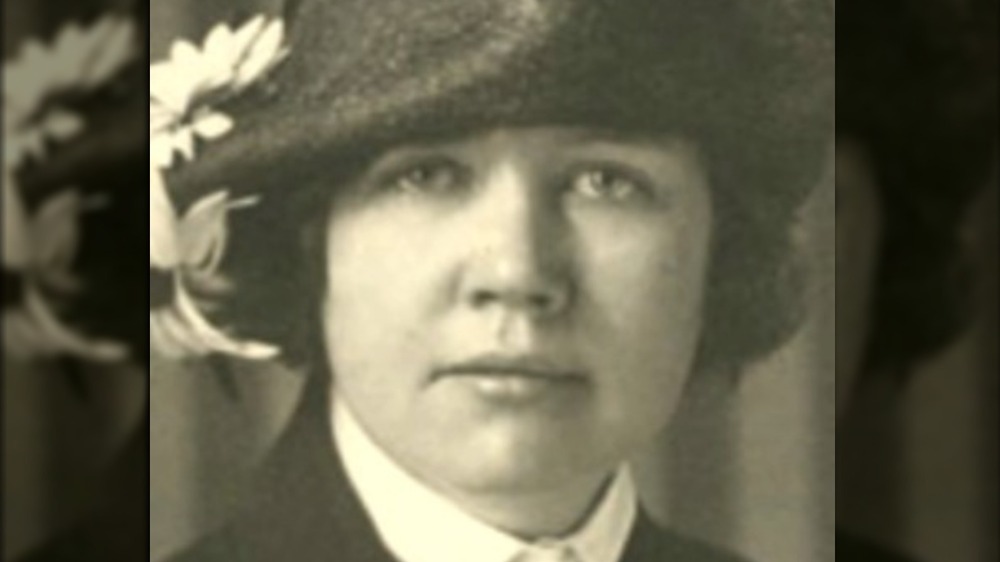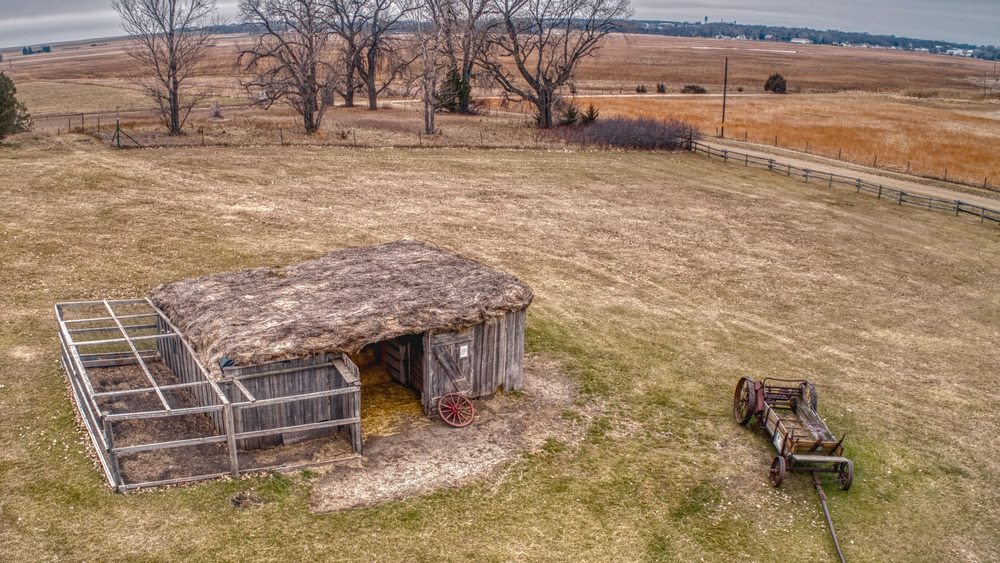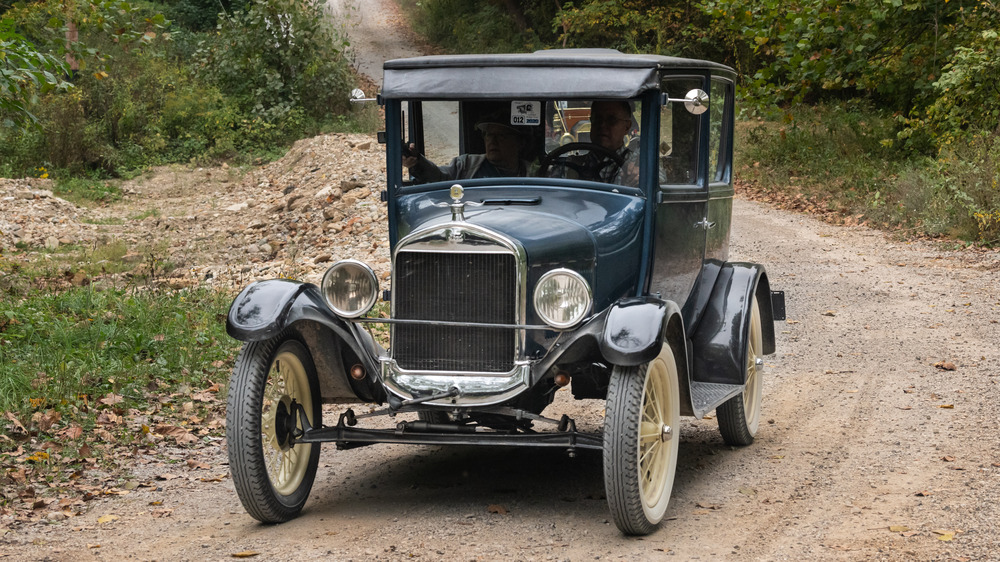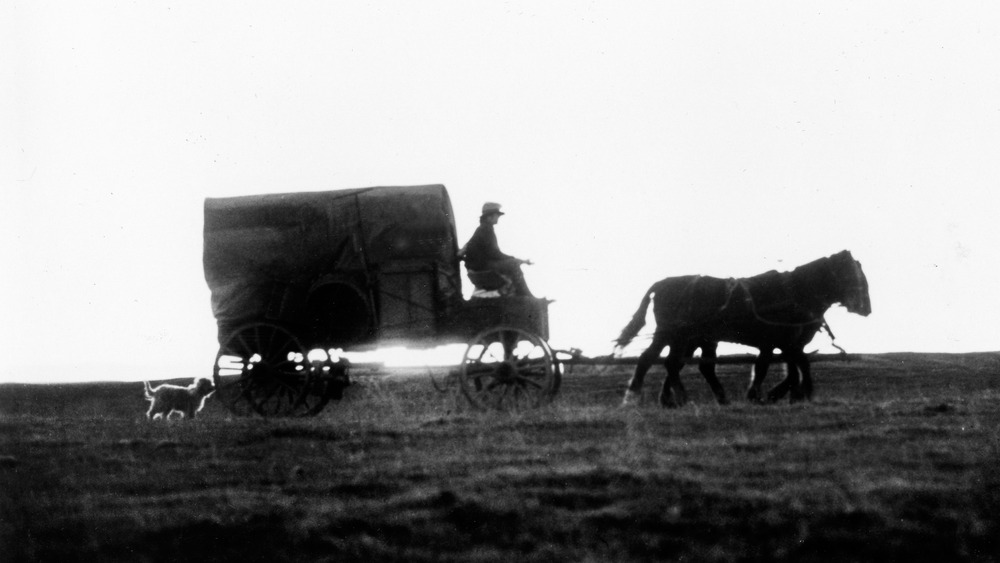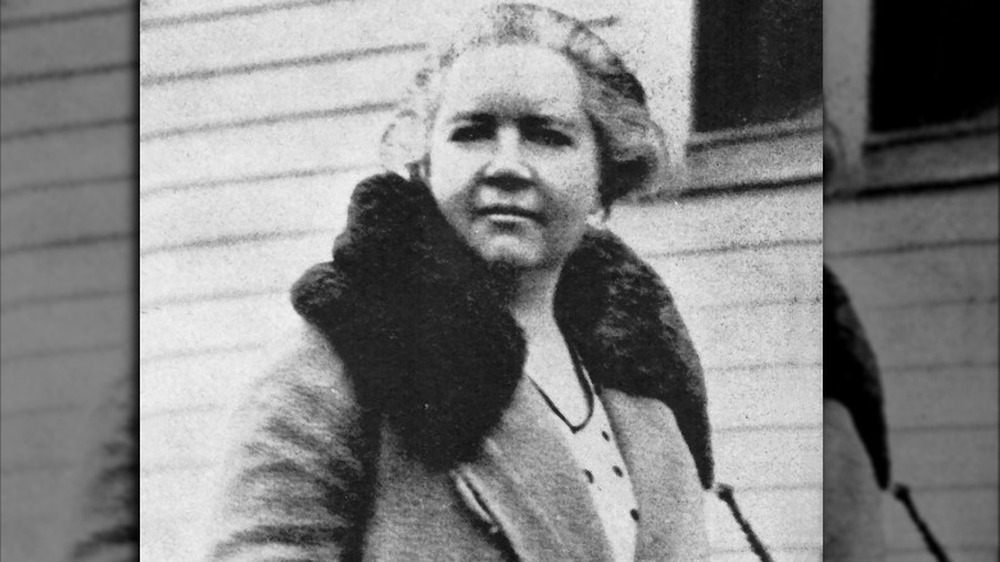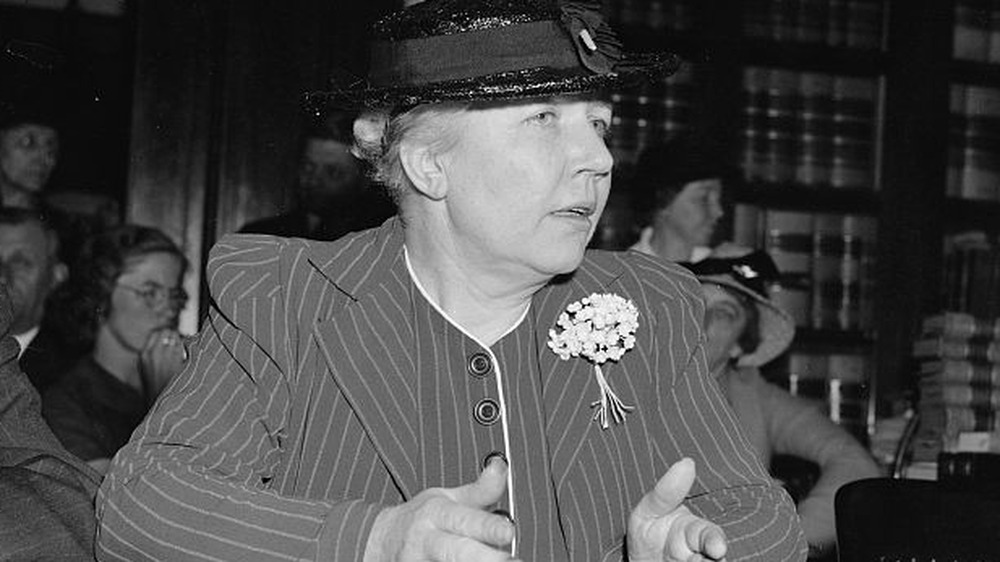The Wild True Story Of Rose Wilder Lane
While most Americans know the story of Laura Ingalls Wilder from the Little House books, it was her daughter, Rose Wilder Lane, who was really the true writer of the family. Whether traveling the world as a journalist, corresponding with powerful people, writing serialized stories for popular publications like Good Housekeeping, or penning political essays, Lane's abundant writings tell her life story, a tale of drive, intelligence, adventure and, at times, heartbreak.
While her life was exceptional, Lane tended to describe herself as anything but: "I'm a plump, middle western, middle class, middle-aged woman," per the Foundation for Economic Education. She could also be challenging at times. Writer Andrew Speno notes she described herself in a 1920s magazine questionnaire as, among other things, restless, irritable, impulsive, reckless and vain, yet, she also had many close, long-term friendships throughout her life (via South Dakota Public Broadcasting (SDPB)).
Much of Lane's work is publicly available to view. Her biography of a future President, The Making of Herbert Hoover, was published in 1920. As a result, a collection of Lane's personal papers is also on permanent display at the Hoover Presidential Library in Stanford, California (via the Herbert Hoover Presidential Library and Museum).
In addition, the Laura Ingalls Wilder House, Rocky Ridge Farm, in Mansfield, Missouri, Wilder's home for 63 years, is a museum devoted to both Lane and her mother. Lane's desk, along with papers and keepsakes from her travels, are featured in a specific section devoted to her.
Her own childhood was far from idyllic
To say Lane's childhood was difficult would be an understatement. Financial issues had plagued her parents even before her birth. They had gotten into debt, and then the year she was born a hailstorm destroyed their wheat crops, reports SDPB, further compounding their monetary woes.
From weather woes like blizzards and droughts to ongoing medical issues that occurred after both parents fell ill with a bad case of diphtheria (via SDPB), life in De Smet, South Dakota wasn't easy. Lane was made fun of by other children for her tattered clothes, The New Yorker reports, and had terrible teeth as a result of malnutrition brought on by the family's abject poverty. In his biography of Lane, The Ghost in the Little House, William Holtz quotes her as stating in 1931, "The fact was that I hated everything and everybody in my childhood with such bitterness and resentment that I didn't want to remember anything about it."
A bright student, she graduated from high school at the top of her class and went on to learn telegraphy, eventually working for Western Union (via SDPB). This unusual choice of employment for a woman at that time was prescient of Rose's future colorful, unconventional life and career.
Lane moved to San Francisco in 1908, and married fellow newspaper reporter Gillette Lane the following year. Pregnancy soon followed, which sadly resulted in a premature, stillborn son, according to Laura's Prairie House.
Her personal life didn't follow conventional rules
The union was an unhappy one and ended in divorce in 1915. Lane never married again. Lane would never again have children, but later unofficially adopted three boys, two of whom were biological brothers and one, Rexh Meta, she met during her travels in Albania, reports SDPB. She looked after them, cared for them and paid for their education, though never made any of the relationships legal.
Fellow writer Helen Dore Boylston, author of the Sue Barton series of books, was both a friend and protégé of Lane's, and even lived at Rocky Ridge with Lane and her parents for a while, Trundlebed Tales writes. Together, Boylston and Lane purchased a Model T Ford and traveled across Europe, later turning journals documenting their adventures into the book Travels With Zenobia: Paris to Albania by Model T Ford.
Lane was the Wilders' only surviving child — a son died as an infant — yet her relationship with her mother was often rocky. The New Yorker quotes Rose as stating that her mother "made me so miserable as a child that I never got over it." They were very different people of very different temperaments, and their relationship was often strained.
Lane supplemented the Wilders' income for years, but when the stock market crashed in 1929, the family's investments crashed with it, reports SDPB. The New England Historical Society notes that because of the Great Depression, Lane's writing opportunities had also evaporated.
Lane had a hand in the success of her mother's books
Her mother had been writing a column for the Missouri Ruralist for over 18 years at that point, and Lane began to look for ways to monetize both of their writings (via SDPB).
After her mother's non-fiction manuscript, Pioneer Girl, was rejected, it was on Rose's advice that Wilder separated out the section on her childhood in Wisconsin, the story that became Little House in the Big Woods, reports SDPB. But Rose also played a heavy hand in the editing and revision of her mother's work. In some ways they became a "mother-daughter editorial team," according to Wilder historian Pamela Smith Hill in Publisher's Weekly. Lane downplayed that notion, particularly to her mother. "I have said nothing about having run the manuscript through my own typewriter, because the changes I made, as you will see, are so slight they could not even properly be called editing," she wrote in a letter to her mother, Holtz reports.
Wilder later donated the handwritten original manuscripts, and, when compared to the published books, it's clear that Lane's contribution had been extensive (via another article posted at Foundation for Economic Education (FEE)). William Holtz stated, "To appreciate Rose Wilder Lane's contribution to her mother's books, one must simply read her mother's fair‐copy manuscripts in comparison with the final published versions. What Rose accomplished was nothing less than a line‐by‐line rewriting of labored and underdeveloped narratives" (via Libertarianism.org).
Writing, journalism, and travels
While her own writings are often overshadowed by her mother's, Rose's debut novel, 1938's Let the Hurricane Roar, received critical commendation. Originally published as a serial in The Saturday Evening Post, it told the story of a young couple, a plague of grasshoppers, and the father leaving to find work, a tale Lane had dredged from her mother's childhood (via SDPB).
After World War I, Lane became a freelance foreign correspondent for the Red Cross Publicity Bureau, traveling across Europe as part of a group of female American reporters shining a light on the misery still being felt in war-torn areas, reports SDPB. She was especially affected by the plight of the people in Albania, whose impoverished peasants, SDPB speculates, might have reminded her of her mother's life of hardships and challenges.
Lane was also "prolific correspondent" (via FEE), often with other notable people of her time. Two books of her letters have been published. One, The Lady and the Tycoon, focuses on letters to DuPont executive Jasper Crane, and another, Dorothy Thompson and Rose Wilder Lane, contains letters spanning their friendship of more than 40 years.
The Mises Institute notes Lane was one of the most financially successful writers in the United States at the time. However, she maintained a lavish lifestyle, often writing just to earn funds. "What I most want is money, but also I do want to write something that says what I want to say," she stated (via SDPB).
Politics and Anti-Progressivism
While Lane's popular legacy rests significantly on her assistance with and appearance in her mother's Little House novels, Lane also became incredibly politically active during her life, and in the end was a driving force in the Libertarian movement.
Lane is considered one of the founding women of libertarianism, along with Isabel Paterson and Ayn Rand (via Libertarianism.org). To some, it's even thought that without them, the movement might never have gained traction. Journalist John Chamberlain wrote (quoted in The Discovery of Freedom), "If it had been left to pusillanimous males probably nothing much would have happened. ... Indeed, it was three women — [Isabel] Paterson, Rose Wilder Lane, and Ayn Rand — who, with scornful side glances at the male business community, had decided to rekindle a faith in an older American philosophy." In Brian Doherty's book, Radicals For Capitalism, his chapter devoted to the women is titled, "The Three Furies for Libertarianism."
Fervently anti-Roosevelt, she considered FDR to be a "dictator" and saw the New Deal as an attempt at social control, and felt the jobs programs would degrade the self-reliance and determination she associated with the American pioneering spirit, states SDPB. An isolationist, she was against the U.S. entering into World War II until after Pearl Harbor.
She toyed with communism in the 1910s, by the time she wrote her essay "Credo" for the Saturday Evening Post in 1936, her politics had swung in the opposite direction. She argued against it, believing it a system antithetical to freedom (via SDPB).
